Short Term Effects of Guided Meditation Isha Kriya on Various Physiological Parameters in Medical Students
DOI:
https://doi.org/10.14738/bjhr.1203.18812Keywords:
Isha Kriya, Guided Meditation, Well-being, Perceived Stress, Pulse RateAbstract
Objectives: Medical students often face heightened stress, anxiety, and emotional turmoil while adjusting to a demanding academic environment. Mind-body practices such as guided meditation can support emotional regulation, enhance concentration, and boost self-esteem. This study evaluated the impact of a six-week Isha Kriya guided meditation program on stress and well-being in first- and second-year MBBS students. Methods: A total of 64 MBBS students participated in daily 15-minute Isha Kriya meditation for six weeks. Baseline assessments included pulse rate, blood pressure (systolic and diastolic), the Perceived Stress Scale (PSS), and a Well-Being Index. These parameters were reassessed at the end of the 2nd, 4th, and 6th weeks. Changes from baseline were analyzed using paired t-tests, with a p-value <0.05 considered significant. Results: Post-intervention data showed a statistically significant improvement in well-being and a reduction in stress and pulse rate. The mean Well-Being Index increased from 62.24 to 75.91 (p = 0.00099). Perceived stress reduced from 0.4495 to 0.3891 (p = 0.005). The pulse rate declined from 92.5 to 83.2 (p = 0.00002). These results suggest a clear benefit of regular guided meditation on mental and physiological health markers. Conclusion: Daily Isha Kriya meditation for six weeks significantly reduced perceived stress and improved well-being and physiological parameters in medical students, highlighting its value as a simple yet effective mind-body intervention.
Downloads
Published
How to Cite
Issue
Section
License
Copyright (c) 2025 Suchitra R Patil, Devesha M, Geetanjali H, Suneeta Kalasuramath, VinodKumar C. S.

This work is licensed under a Creative Commons Attribution 4.0 International License.






